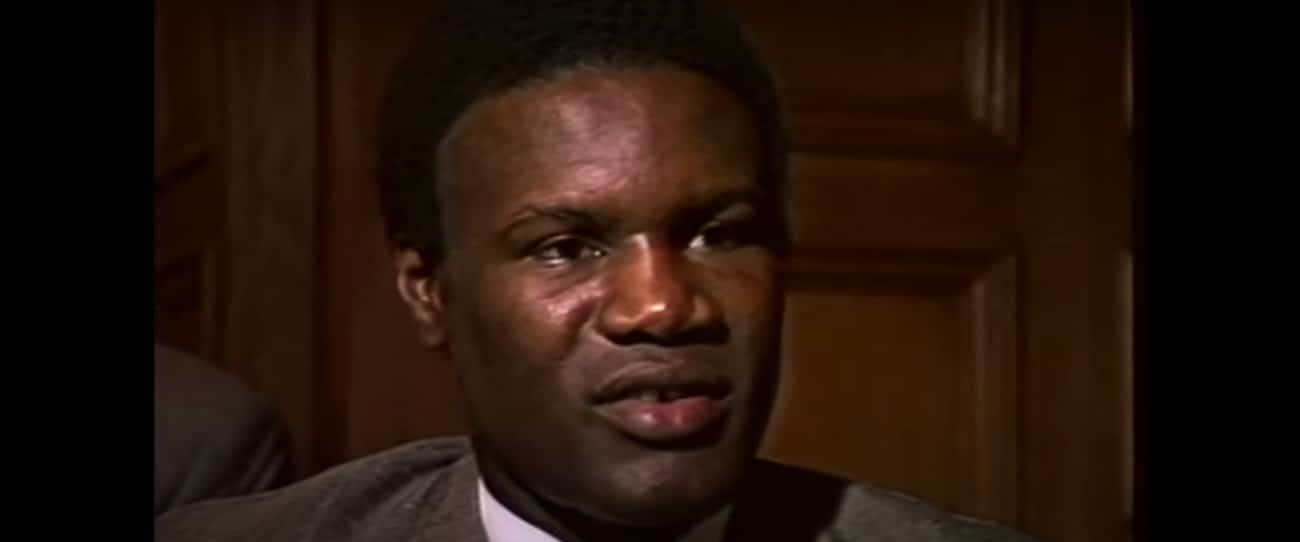Three fights, three different venues, three different results; the non-stop action the same in each battle. British warrior Dennis Andries and Australian hard man Jeff Harding; together they gave us THE hardest, toughest, most exhausting light-heavyweight trilogy of the late 1980’s/early ’90’s.
It was the second fight, of thirty long years ago this month (July 28) that saw the only KO of the series. And it was amazing old man of the ring Andries who scored it – in Harding’s home country of Australia. Officially 36 years old but very likely a good deal older, Andries made the long-haul trip to Australia with one thing on his mind: revenge.
Andries, the WBC 175 pound king, had lost his belt in a big upset, an unknown Harding stopping him in the final round in Atlantic City the previous June. It was a great fight, with both men taking turns unleashing leather in a ‘I’ll hit you, you hit me’ battle of guts and attrition. It was the birth of the fierce trilogy. Harding, his face a mask of blood, got the win but he knew he’d have to meet Andries again.
And so it was, a little over a year later, Andries, this time with the full attention of Emanuel Steward (who had been largely devoted to Tommy Hearns’ upcoming rematch with Sugar Ray Leonard ahead of Andries-Harding I), challenged Harding in his home country. “I want to make him feel pain he has never felt before,” Andries said before the second guaranteed war.

Fight-two took off where the first fight had ended; with the two men knocking chunks out of one another. Steward had shortened up Andries’ shots and the Kronk master had trained his fighter for what they both knew was coming – another all-out slugfest that would be won not by superior tactics, but by sheer heart and drive. But Andries, who faded in the final minutes of the first fight, was now a year older; how could he improve on his losing performance? Andries did blame the drain of making weight for the loss, but this time he had made 175 the right way. He was full of energy and ready to go back to hell whilst forcing Harding to make the trip with him.
But Harding, a relentless arm-puncher who had an absolute rock for a head, was also ready. The defending champ’s corner tried to instruct their man to avoid Andries’ seemingly can’t-miss right hand to the head, but Harding blocked practically everything that came at him with his face. As with fight-one, the pace was set by Andries, with Harding taking a real going over. But then, also like the first fight, Harding, a slow starter, got going as Andries began to wilt, at least a little.
The fierce trading was awesome to watch and it was clear these two men were about as evenly matched a pair of fighters as could possibly be thrown together. Andries, his gas tank trickling down, gambled big time in the seventh round. Coming out like a mad man, Andries threw everything at a rival who was over a decade younger than him. Harding soaked it all up, until three ungainly but hard and effective right hands cracked into his skull. A final, almost bowler-like right smashed home, high on Harding’s head and down he went. Dazed, drained, and shattered, Harding was counted out. Andries did a somersault in victory. It was an amazing moment for an amazing fighter; it was a shining moment for all of British boxing.
The two men were now all-even. A third trip to the depths of ring hell would come soon enough. For now, Andries was a three-time light-heavyweight champion. Has any British fighter ever scored a finer, more impressive win whilst fighting in Australia? The seventh-round KO he suffered would prove to be the one and only stoppage loss of Harding’s career.
